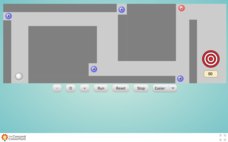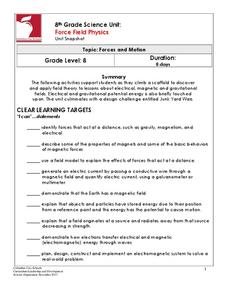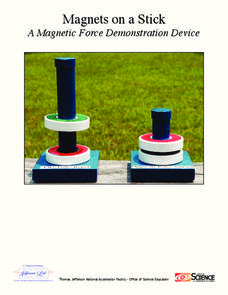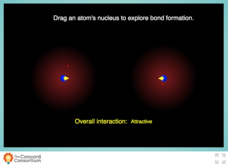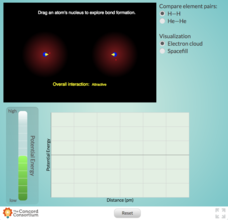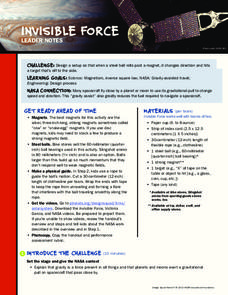Concord Consortium
Electrostatics: Maze Game
Ready to have an a-MAZE-ing time teaching electrostatics? Introduce physical science superstars to an engaging resource that tests their knowledge of attractive and repulsive forces. Pupils change the charge of a ball to guide it through...
Columbus City Schools
Force Field Physics
Attracted class members to an activity-packed journey through the science behind the invisible forces at work all around us. From jump rope generators to junkyard wars, there's never a dull moment when eighth grade physics scholars...
Science Matters
Static Electricity
Working with static electricity is sure to give the class a charge! Budding scientists experiment with balloons and different materials to discover how to create static electricity. They learn about the transfer of electrons and the...
Science Matters
Electricity and Magnetism Formative Assessment #1
A formative assessment is a great tool for planning further instruction. The fifth lesson of a 14-part series exploring magnetism and electricity provides questions to gauge current understanding of magnetic fields, compasses, and forces...
Science Matters
May the Magnetic Force Be with You
Attraction and repulsive forces might seem mysterious to young learners. Have your classes experiment with these forces in the second installment of a 14-part unit on magnetism and electricity. Individuals test different objects in the...
Physics Classroom
Polarization
Are your young physicists static-savvy? Test their skills using an engaging interactive from the Static Electricity series! Learners evaluate scenarios to determine how charges move between conductors and insulators, then identify...
Physics Classroom
Charge Interactions
Has your class been repelled by your previous magnetism lesson plan? Try a fun interactive instead! The activity, part of the Static Electricity series, challenges scholars to infer the charges of a group of magnets based upon their...
US Department of Energy
Magnets on a Stick: A Magnetic Force Demonstration Device
Why do some magnets attract while others repel? Scholars use clearly labeled permanent magnets to explore the attractive question. They compare the behavior of like versus opposite poles to find the answer.
Royal Society of Chemistry
Electronegativity Values
Finally, an electronegativity resource your class will be strangely drawn to! Skilled scientists manipulate interactive puzzles to gain an understanding of common electronegativity values. The great thing? You can conduct the lesson...
Concord Consortium
Direction of Force on Charged Objects
Make your unit on magnetism a force to be reckoned with! Physical science scholars examine the direction of force on charged objects through a simple interactive. Pupils control the charge of the stationary object, then observe how it...
Concord Consortium
Opposites Attract
Whether they pull together or push away from one another, magnets are sure-fire pupil pleasers! Take their study of magnetism to a new level with a fun interactive. Individuals control the polarity of two spheres to observe attractive or...
Concord Consortium
Forming a Molecule
What does it look like when two atoms bond? Mol-e-COOL! Aspiring chemists observe the interaction between two atoms forming a bond in an easy-to-use interactive. Individuals move atoms closer together and observe changes in attraction...
Concord Consortium
Energy of Bond Formation
Show your chemistry class that there's much more to covalent bonding than sharing electrons! Pupils manipulate atoms of hydrogen, oxygen, and carbon to observe the energy of bond formation using a well-rounded interactive. The resource...
Concord Consortium
Non-Bonding
What makes helium so Noble, anyway? Explore the bonding properties of helium versus those of hydrogen using an interactive resource. Science scholars manipulate atoms of each element and observe changes in potential energy as the atoms...
CK-12 Foundation
Earth's Magnetic Field: Compass Poles
You'll be strangely drawn to this activity! Physical science pupils learn how compasses work in an interesting interactive. The content covers magnetic poles, Earth's magnetic field, and what would happen if Earth's poles swapped places.
PBS
Invisible Force
Investigate invisible forces. Young engineers design a setup that changes the direction of a steel ball using a magnetic force. The purpose of the setup is to model the gravitational pull of spacecraft by planetary bodies.
Teach Engineering
Fun With Nanotechnology
Introduce your class to nanotechnology applications with three demonstrations that showcase scientific principles related to ferrofluids, quantum dots, and gold nanoparticles. Groups will work more closely with these applications in the...
Urbana School District
Magnetism
The compass was first used in 206 B.C., but we didn't discover magnetic poles until 1263 A.D. Presentation begins with the history of magnetism before continuing on to magnetic fields, magnetic forces, electromagnets, currents,...
Teach Engineering
Magnetic or Not?
The class must determine the magnetic properties of different materials, including aluminum and steel by sorting through materials using a magnet. Groups make a prediction on whether a material is magnetic and then perform tests to...
Curated OER
The Power of Magnets
Young scientists view this interactive slide show which teaches them about magnetism. Students test a variety of objects such as: a pencil, paper clip, penny, marble, and yarn to see if they can make a magnet move. Students see that the...
Teach Engineering
Magnetic Fields
Introduce your class to magnetic fields with an activity that demonstrates that a compass is affected by the magnetic field of the earth, unless a closer, stronger magnetic field is present. Pupils can use this fact in the associated...
Teach Engineering
Magnetic Materials
The design challenge: develop a method to separate steel from aluminum. The first lesson plan in an eight-part series introduces the class to the grand challenge of ciming up with a method to streamline a sorting process at a recycling...
Teach Engineering
Magnetic Fields Matter
Help your young scientists learn which materials are affected by magnetic fields with an activity that presents the information about different types of materials — diamagnetic, paramagnetic, and ferromagnetic — and their interaction...
Curated OER
What's the Attraction
Students sort objects based on magnetism. In this magnetism lesson, students are given a variety of objects, then predict whether the object will be attracted to a magnet and test their hypothesis as they sort the objects into "yes" and...


